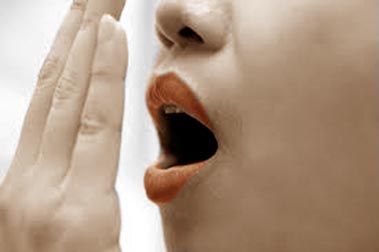|
Health Check:
What's really causing your bad breath?
|

Pic: shelbyearnoseandthroat.com |
We've all had that colleague, friend or teacher with the unbearable
bad breath. It's an unfortunate social faux-pas that is all too common
and sometimes leads to obsessive use of mouthwash, mints and chewing
gum. Unfortunately, constant cover-ups don't treat the root cause of bad
breath. Mouthwashes usually contain alcohol and may actually dry out
delicate mouth and sinus tissues, perpetuating the problem. Mints and
chewing gums are frequently made with artificial flavours and chemical
sweeteners, which come with their own range of potential side effects
including digestive discomfort and headaches.
So how can we uncover and address the true reason for bad breath?
There are actually many ways this problem can come about - some that are
fairly obvious, and others that can be quite insidious and difficult to
detect. Sometimes bad breath actually does originate in the mouth
Oral hygiene: Not brushing your teeth often enough can lead to the
build-up of a film of bacteria called plaque. Got pink in the sink when
you brush? This is due to gum irritation, which is referred to as
gingivitis. The irritation is usually there because of bacteria living
in the gaps between the teeth and gums.
The same may happen on the textured surface of the tongue, or on
dentures that are not properly cleaned or sanitized. We recommend
regular flossing, brushing with a gentle natural toothpaste, and the use
of an Ayurvedic tongue scraper to keep mouth bacteria in check.
Certain foods: Consuming high-sulphur foods, such as onions and
garlic, can change the smell of your body, not just directly from eating
them, but also by altering your blood chemistry. However, they are also
very helpful for a robust immune system, so we don't recommend avoiding
them. Instead, just ensure you are eating a wide variety of different
vegetables, herbs and spices, rather than relying too heavily on any
particular type.
Consuming citrus fruits, on the other hand, can help improve bad
breath, since their essential oils have antibacterial abilities, helping
to kill smelly bacteria and remove phlegm.
Dry mouth: Many medical conditions can cause mouth breathing or
reduced saliva production, which can lead to a dry mouth. Saliva is very
important for keeping tissues lubricated and moving food particles out
from between the teeth and gums.
It also contains enzymes that are vital for digesting food. Without
enough saliva, food and plaque can accumulate and result in unpleasant
odours. Some examples of conditions causing dry mouth include hormonal
imbalances, sleep apnoea, and the use of a wide range of medications
including those used for anxiety, allergies and epilepsy.
While some incidences of smelly breath may be solved with the easy
fixes outlined above, the real cause commonly lies in less expected
areas of the body, such as the throat and sinuses.
Throat and sinus issues that can cause bad breath
The throat and sinuses have many areas that can collect mucus - this
in turn harbours malodorous bacteria. It's pretty unpleasant to think
about, but that nasty smell might actually be coming from slime in the
back of your throat.
Tonsil stones: The tonsils are sacs of lymphatic fluid that rest at
the back of the throat and help protect against infections by invading
disease-causing bacteria. They are not smooth, but rather have pits and
crevices that serve as collection points for mucus, food, bacteria, and
calcifications called tonsil stones.
Tonsil stones are not well understood, although studies have shown
that up to six percent of the population may be harbouring them. The
stones can be removed using a simple salt water rinse at home, or by
using an oral irrigation device. The surface of the tonsils can also be
smoothed using a laser procedure, if the situation causes repeat issues.
Regular gargling is likely a good preventative measure against tonsil
stones.
Post-nasal drip: This condition is where the rear of the sinuses and
the throat are consistently plagued by mucus. If you are always clearing
your throat, a post-nasal drip could be the reason. Mucus can harbour
bacteria that cause a bad odour. Some common causes of this
uncomfortable chronic condition are breathing dry air, allergies and
bacterial infections. Food intolerances can also cause a post-nasal
drip, particularly issues with the consumption of dairy foods.
Sinus infection: Similar to post-nasal drip, chronic sinus infections
can also cause bad breath. The nose and throat are intimately connected
and have a common bacterial environment. If this is out of balance,
unpleasant odours can result. Holistic remedies, such as using a neti
pot or administering fire cider, can be helpful against a chronic sinus
infection. However, seeing a knowledgeable practitioner is likely a good
idea as well.
Is the problem further down?
For many people, the issue can start further down in the digestive
tract.
Oesophageal and digestive issues: Acid reflux happens when the
sphincter between the oesophagus and stomach is not functioning
correctly. This can be due to eating too fast, food intolerances or low
stomach acid. Poor digestion can cause food to putrefy in the stomach
and can leak up through a poorly-functioning oesophagus. Try improving
your stomach acid production and digestion instead.
Small intestinal bacterial overgrowth (SIBO): This is a complex
problem that can have many contributing causes and result in many
symptoms.
Essentially, any abnormal growth of bacteria within the small
intestine, also referred to as the small bowel, can result in a
pathogenic condition. The bacteria thriving here give off gases, which
escape through your mouth and are interpreted as bad breath.
The Alternative Daily |

